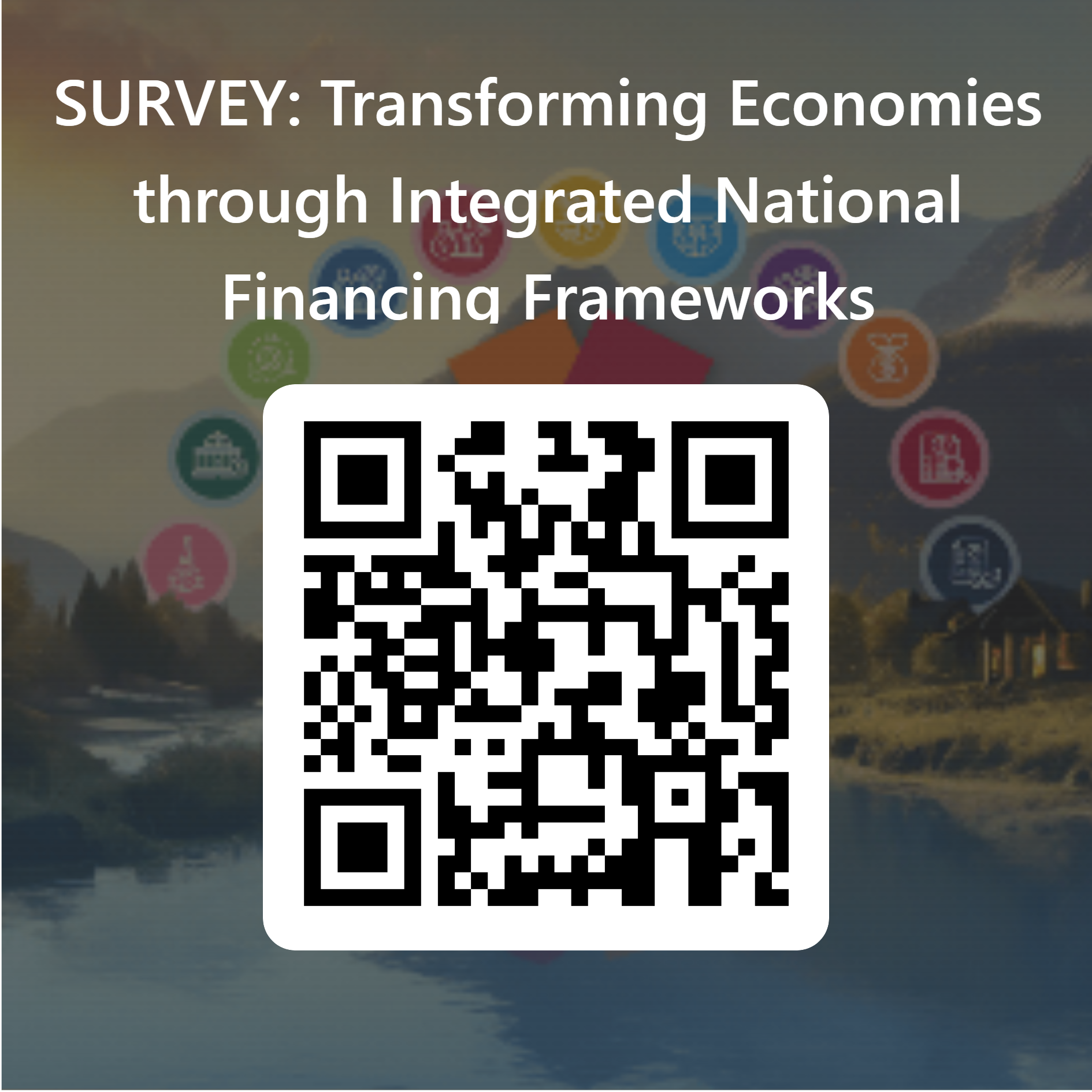
View the Morning Session Here (10:00am-1:00pm)
View the Afternoon Session Here (3:00pm-4:30pm)
View the Presentations:
Powerpoint:
Video:
BACKGROUND
Integrated national financing frameworks (INFFs) represent a holistic approach to mobilizing, allocating and managing financing for development to achieve national priorities and the Sustainable Development Goals (SDGs). They also aim to optimize resource utilisation, enhance transparency, and foster coherence in policymaking. Since the introduction of the INFF concept in the 2015 Addis Ababa Action Agenda, and subsequent development of global INFF guidance, over 80 countries have started to implement INFFs. Country experiences with INFFs demonstrate their transformative potential in diverse contexts and underscores the adaptability of INFFs to help governments address unique challenges while fostering synergies between different stakeholders, such as development partners, the private sector, civil society, and academia.
Global support for INFF implementation has also steadily increased, including through a project of the 13th tranche of the Development Account (DA13), implemented jointly by the United Nations Department of Economic and Social Affairs (UNDESA), United Nations Conference on Trade and Development (UNCTAD), Economic Commission for Latin America and the Caribbean (ECLAC), Economic Commission for Europe (ECE), Economic Commission for Africa (ECA), Economic and Social Commission for Western Asia (ESCWA) and Economic and Social Commission for Asia and the Pacific (ESCAP). The $2.3 million DA project, “Towards Integrated National Financing Framework,” commenced in 2021, targeting over 10 countries and is due to conclude in 2024. This DA project has contributed to the broader efforts by the UN system to support countries in implementing INFFs, with support from the Joint SDG Fund, and Regular Programme of Technical Cooperation, and expanding to the G20 voluntary framework for support for INFFs. In 2022, the INFF Facility was set up to respond to the demand for support from countries developing INFFs. The Facility is a joint initiative of the United Nations Development Programme (UNDP), UN DESA, the Organisation for Economic Co-operation and Development (OECD) and the United Nations Children Fund (UNICEF) and is supported by the European Union and the Governments of Italy and Sweden.
ABOUT THE EVENT
UNDESA, in collaboration with the five United Nations Regional Commissions and UNCTAD are organizing an INFF Event to mark the culmination of activities undertaken over the last 3 years as part of the DA13 INFF project. With the theme of "Transforming Economies through Integrated National Financing Frameworks (INFFs)," the Event provides a platform for the countries involved (Belarus, Burkina Faso, Colombia, Dominican Republic, Egypt, Indonesia (TBC), Jordan (TBC), Kyrgyzstan, Pakistan, Zambia) to share their experiences. This includes sharing valuable lessons and identifying common challenges faced in applying INFFs to finance sustainable development at the national level. The Event aims to critically examine these experiences to identify practical insights that can improve the future application of INFFs, along with identifying strategies that can enhance the effectiveness and scalability of INFFs so that they can be adapted to various contexts and contribute to achieving the Sustainable Development Goals. It aims to explore how INFFs can be refined and expanded to consider the dynamic global economic landscape and the evolving nature of development financing. The Event will also highlight the convergence of support for INFF implementation by countries, development partners, private sector, civil society, and academia.
DRAFT PROGRAMME
|
TIME |
SESSION |
|
10:00-10:15 |
Opening session
Facilitator: Ms. Shari Spiegel, Director, Financing for Sustainable Development Office (FSDO), UNDESA
Administrator and Director, Bureau for Policy and Programme Support, UNDP |
|
10:15-11:40 |
Session 1: Advancing resilient and inclusive economies through INFFs
This session aims to highlight the versatility and adaptability of INFFs as a potent tool for advancing resilient and inclusive economies. Through country experiences, it will showcase how INFFs can serve as effective tools for countries to mobilize resources, drive inclusive growth and meet national development goals and the SDGs.
Guiding questions: For Countries (7 mins)
strategies or relevant focus area.
implementation and what support do you anticipate you would need? For Respondents (5 mins)
|
|
|
Moderator: Mr Daniel Titelman, Director, Economic Development Division, ECLAC
Development, Dominican Republic
International Cooperation and Director of Performance and Delivery Monitoring Unit, Jordan
Subdirectorate General of Investments, Monitoring and Evaluation, National Planning Department, Colombia
Respondents
|
|
11:40-13:00 |
Session 2: Strengthening national capacity to mobilize domestic resources
INFFs can help mobilize domestic resources to support national priorities, including efforts to combat illicit financial flows and leverage digital solutions for enhancing tax compliance. This session will examine country experiences in this area.
Guiding questions: For Countries (7 mins)
implementation and what support do you anticipate you would need? For Respondents (5 mins)
|
|
|
Moderator: Mr. Gamal Ibrahim, Chief, Economic Governance and Public Finance Section, Macroeconomics and Governance Division, ECA
Respondents
|
|
13:00-15:00 |
BREAK |
|
15:00-16:10 |
Session 3: Harnessing the potential of the private sector for sustainable development
INFFs encompass capacity-building initiatives aimed at strengthening national institutions and enhancing stakeholders' capabilities. This session will examine how public-private partnership and infrastructure evaluation tools and entrepreneurship training can help harness the potential of the private sector. It will also cover the role of sustainability reporting in fostering sustainable finance and investment.
Guiding questions: For Countries (7 mins)
implementation and what support do you anticipate you would need? For Respondents (5 mins)
Moderator: Mr Richard Bolwijn, Acting Director, Division on Investment and Enterprise, UNCTAD
|
|
|
|
|
|
|
|
16:10-16:30 |
Development partner reflections and closing session
|
